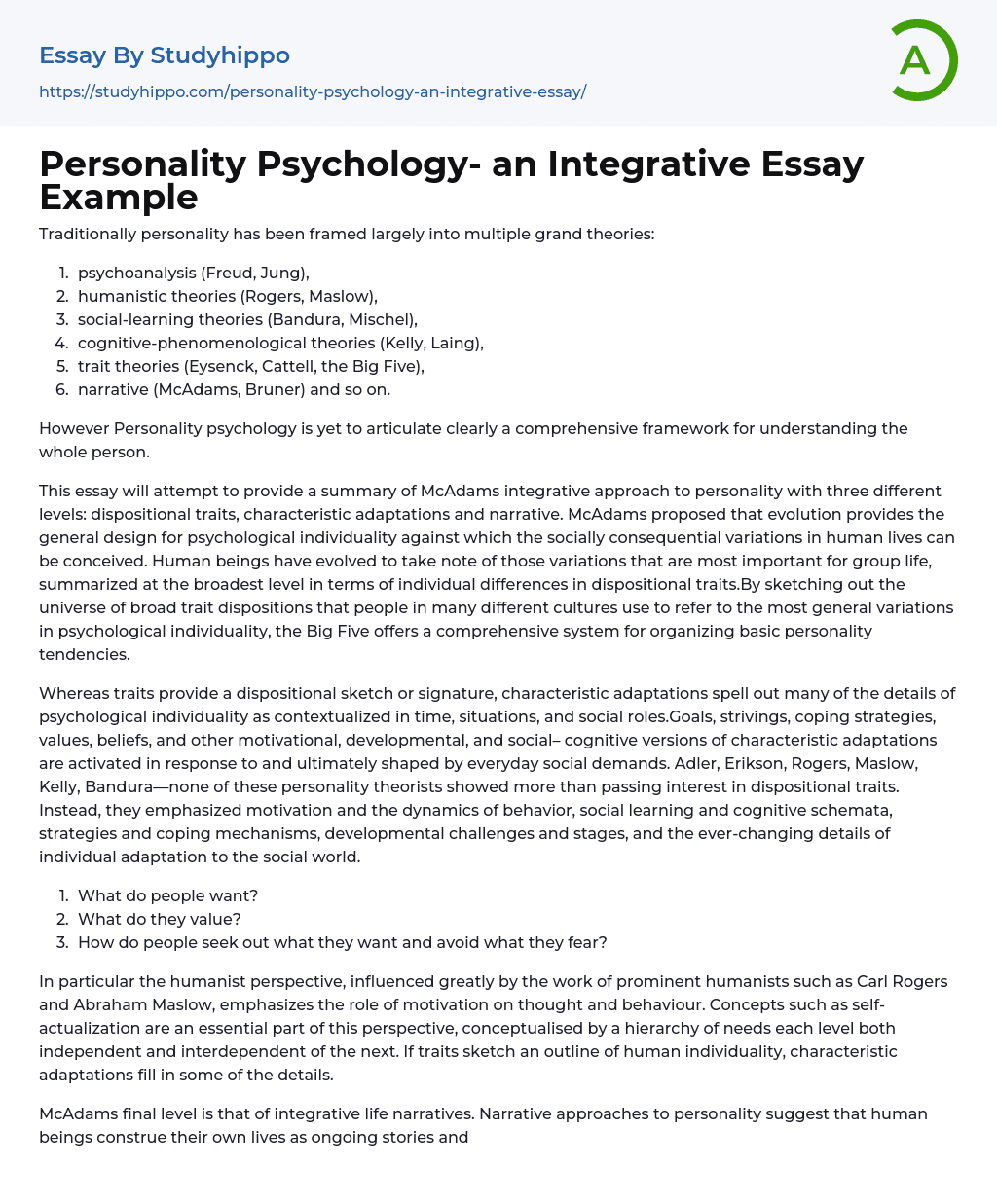Traditionally personality has been framed largely into multiple grand theories:
- psychoanalysis (Freud, Jung),
- humanistic theories (Rogers, Maslow),
- social-learning theories (Bandura, Mischel),
- cognitive-phenomenological theories (Kelly, Laing),
- trait theories (Eysenck, Cattell, the Big Five),
- narrative (McAdams, Bruner) and so on.
However Personality psychology is yet to articulate clearly a comprehensive framework for understanding the whole person.
This essay will attempt to provide a summary of McAdams integrative approach to personality with three different levels: dispositional traits, characteristic adaptations and narrative. McAdams proposed that evolution provides the general design for psychological individuality against which the socially consequential variations in human lives can be conceived. Human beings have evolved to take note of those variations that are most important for group life, summarized at the broadest level in terms of individual differences in dispositional traits.By sketching out the
...universe of broad trait dispositions that people in many different cultures use to refer to the most general variations in psychological individuality, the Big Five offers a comprehensive system for organizing basic personality tendencies.
Whereas traits provide a dispositional sketch or signature, characteristic adaptations spell out many of the details of psychological individuality as contextualized in time, situations, and social roles.Goals, strivings, coping strategies, values, beliefs, and other motivational, developmental, and social– cognitive versions of characteristic adaptations are activated in response to and ultimately shaped by everyday social demands. Adler, Erikson, Rogers, Maslow, Kelly, Bandura—none of these personality theorists showed more than passing interest in dispositional traits. Instead, they emphasized motivation and the dynamics of behavior, social learning and cognitive schemata, strategies and coping mechanisms, developmental challenges and stages, and the ever-changing details of individual adaptation to the social world.
- What do people want?
In particular the humanist perspective, influenced greatly by the work of prominent humanists such as Carl Rogers and Abraham Maslow, emphasizes the role of motivation on thought and behaviour. Concepts such as self-actualization are an essential part of this perspective, conceptualised by a hierarchy of needs each level both independent and interdependent of the next. If traits sketch an outline of human individuality, characteristic adaptations fill in some of the details.
McAdams final level is that of integrative life narratives. Narrative approaches to personality suggest that human beings construe their own lives as ongoing stories and that these life stories help to shape behavior, establish identity, and integrate individuals into modern social life Narrative identity is indeed that story the person tries to “keep going”—an internalized and evolving narrative of the self that incorporates the reconstructed past and the imagined future into a more or less coherent whole in order to provide the person’s life with some degree of unity, purpose, and meaning.The psychosocial construction of narrative identity moves personality from broad trends (dispositional traits) and the specific responses to daily life demands (characteristic adaptations) to the challenge of making meaning out of one’s life in a complex world.
Dispositional traits play the fundamental role of sketching the outline while characteristic adaptations fill the details of human individuality, then narrative identities give individual their unique and culturally anchored meanings.While McAdams describes personality in terms of these three levels: dispositional trait, characteristic adaptations and narrative; there is an underlying notion that influences them all, culture.. At the level of dispositional traits, culture
provides display rules and demand characteristics for behavioural expression, but culture has little impact on the magnitude or strength of traits.
At the level of characteristic adaptations, culture sets agendas for the timing and content of goals, strivings, relational patterns, and the like. Culture has its strongest impact at the level of life narrative, providing a menu or anthology of arrative forms from which individuals draw in making meaning out of their lives. In conclusion, Personality is an individual’s unique variation on the general evolutionary design for human nature, expressed as a developing pattern of dispositional traits, characteristic adaptations (notions from humanistic, psychodynamic, social-cognitive approaches), and integrative life stories complexly and differentially situated in culture. The principles articulated in this essay mark a newfound effort to assume a central and integrative position within the discipline of personality psychology.
- Motivation essays
- Big Five Personality Traits essays
- Mind essays
- Phobias essays
- Body Image essays
- Thought essays
- Bias essays
- Unconscious Mind essays
- Abnormal Psychology essays
- Abraham Maslow essays
- Attachment Theory essays
- Authority essays
- Behaviorism essays
- Classical Conditioning essays
- Cognitive Psychology essays
- Counseling essays
- Developmental Psychology essays
- Educational Psychology essays
- Erik Erikson essays
- Family Therapy essays
- Jean Piaget essays
- Maslow's Hierarchy Of Needs essays
- Mental Health essays
- Operant Conditioning essays
- Personality Psychology essays
- Positive Psychology essays
- Psychoanalysis essays
- Psychotherapy essays
- Sigmund Freud essays
- Social Psychology essays
- Stanford Prison Experiment essays
- Supersize Me essays
- John Locke essays
- 9/11 essays
- A Good Teacher essays
- A Healthy Diet essays
- A Modest Proposal essays
- A&P essays
- Academic Achievement essays
- Achievement essays
- Achieving goals essays
- Admission essays
- Advantages And Disadvantages Of Internet essays
- Alcoholic drinks essays
- Ammonia essays
- Analytical essays
- Ancient Olympic Games essays
- APA essays
- Arabian Peninsula essays
- Argument essays




